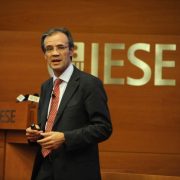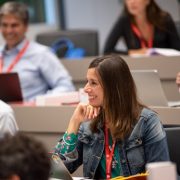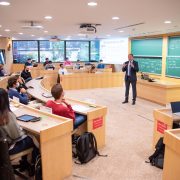- This week a case study exploring how Vall d’Hebron University Hospital was able to effectively manage the COVID-19 crisis was discussed for the first time in an IESE MBA class
- The case is available for sale from today on the portal IESE Publishing, allowing it to be debated by students from business schools across the world.
- IESE Business School has been using the case method as a learning methodology in the business world for more than 60 years.
A case study exploring how Vall d’Hebron University Hospital managed the first wave of the COVID-19 crisis was presented today in class to IESE MBA students by IESE professor and author of the case, Jaume Ribera, and the managing director of the Vall d’Hebron University Hospital, Albert Salazar.
During the class, Dr. Salazar explained how Vall d’Hebron was able to transform itself during the first wave of the pandemic so that it could manage the greatest health crisis experienced by the Hospital. In this class, Dr. Albert Salazar presented the Vall d’Hebron management model and the main operational decisions that made it possible to face the first wave of the health crisis. For his part, Jaume Ribera, IESE professor and Academic Director of the Center for Research in Healthcare Innovation Management, led the discussion of the case, attending to all the proposals, presentations and questions from the students, and drawing out the learning points for other hospitals and business managers.
The IESE professor explained that “investigating how the pandemic was managed in a hospital like Vall d’Hebron is important, since up to now there has not been anything written about pandemic management in a hospital.” With this case study, “we have been able to see a real example of the evolution of the different phases of a crisis, and how it fits into the future strategy of a hospital center.”
The case method
The case method is a learning methodology based on learning by doing, which aims to prepare students for making strategic decisions in companies through the practice of real situations. It is the main learning methodology at IESE, but not the only one.
The students who have discussed the case in class belong to the IESE MBA Program, which is made up of more than 700 students, more than 80% of whom are international. They have an average age of 29 years. The program, which is taught in English and lasts between 15 and 19 months, was chosen by The Economist as the best MBA program in the world this past January.
This case joins the more than 200 case studies written by IESE professors in the last three years, reflecting IESE´s aim of always being up-to-date in the analysis of business problems that arise in the classroom, which include cases of current topics, like Netflix, Barça or Spotify, among many others. At IESE, the cases students study are not just based on superstar big name leaders but the real practical problems faced by managers in variety of contexts, including in developing countries, in small businesses, and in environments where corruption is rife, helping to bring to life the varied situations leaders may encounter.
A radical transformation of Vall d’Hebron since the beginning of the pandemic
The management of the pandemic has been based on two axes, according to Dr. Salazar, managing director of Vall d’Hebron: “the need to work on any project in collaboration with all the region´s actors and, internally, to strengthen multidisciplinary teams. COVID-19 has shown us that breaking the traditional silos, sharing knowledge and working jointly across specialties, levels, doctors and nurses, can make it possible to achieve far superior results in terms of patient care.”
In Vall d’Hebron, the transformation started very early, even before there was a single case in Catalonia. The Hospital anticipated the arrival of the pandemic by drawing up protocols for action against COVID-19 and contingency plans that proposed up to a dozen scenarios in which, in the worst cases, ICU beds would triple and hospitalization would double. At the end of January 2020, a Coordination Committee was also created made up of the Hospital’s management team and the leaders of the specialties most directly involved in the pandemic. In the committee meetings, which are still held, the evolution of the pandemic is analyzed and management decisions are taken based on the situation.
In anticipation of the avalanche of incoming demand, hospital management believed that all of Vall d´Hebron´s professionals (doctors, medical residents, nurses, etc.) should participate in the challenge. To this end, an innovative decision was made: instead of areas of specialty, everyone would participate in “COVID-19 teams;” each team would be led by a doctor in a specialty key to managing the pandemic (such as infectious diseases, epidemiological preventive medicine, pulmonology, etc.), with anesthetists supporting intensive care doctors (since their work in the operating room had been greatly reduced during the pandemic with the postponement of nearly all scheduled procedures.) These teams, which participated in emergency, hospitalization and critical care services, were key in managing the crisis; without the collaboration of professionals from other specialties, it would have been impossible to meet all the pandemic needs.
Likewise, an emergency public procurement model was designed in order to obtain the necessary PPE supplies, services and materials. Around 800 workers, including those in administration, doctors, pharmacists, etc. were sent home to continue their work remotely and thereby mitigate the risk of contagion. All outpatient visits were suspended and appointments were conducted online or by telephone. The home delivery of medications was also promoted. Family visits to patients were also suspended. As of today, non-COVID-19 patients are allowed visits in certain time slots, but COVID-19 patients are only allowed visits during the end-of-life process.
Another key aspect is internal communication. Through weekly, streamed information sessions, all hospital professionals are kept informed of the latest news and any changes that may be applied to face the crisis. All information is also hosted on a sub-intranet, which was created ad-hoc for all communication related to the coronavirus.
Future challenges and new collaboration with IESE
Coping with the pandemic is an on-going challenge. During the first and second waves, Vall d’Hebron continued its transformation to face the challenge of different future scenarios. As part of this, on February 16 2021, the hospital inaugurated its new Garbí building, a multipurpose space dedicated to the care of patients with COVID-19 in Vall d’Hebron. The building has 56 acute beds and 32 critical and semi-critical beds and concentrates the care of patients with COVID-19.
IESE and Vall d’Hebron will also continue their collaboration to transmit the Hospital’s management model during this pandemic. In the near future, Dr. Salazar will offer other classes at IESE that delve into the key aspects of Vall d’Hebron management.
About IESE Business School
IESE is the graduate business school of the University of Navarra. It is one of the world’s most international business schools, with campuses in Barcelona, Madrid, Munich, New York and São Paulo, and programs offered throughout Europe, Africa, Asia and the Americas. For more than 60 years, IESE has been at the forefront of management education and leadership development. It has done this through offering transformational educational experiences to more than 50,000 entrepreneurs and executives. IESE´s mission today remains the same as it was back when it was founded in 1958: to educate and inspire leaders who wish to have a positive and lasting impact on people, business and society. This effort has been recognized by the Financial Times ranking, which for the sixth consecutive year has positioned IESE as the number 1 school in the world for executive education. Web: www.iese.edu










